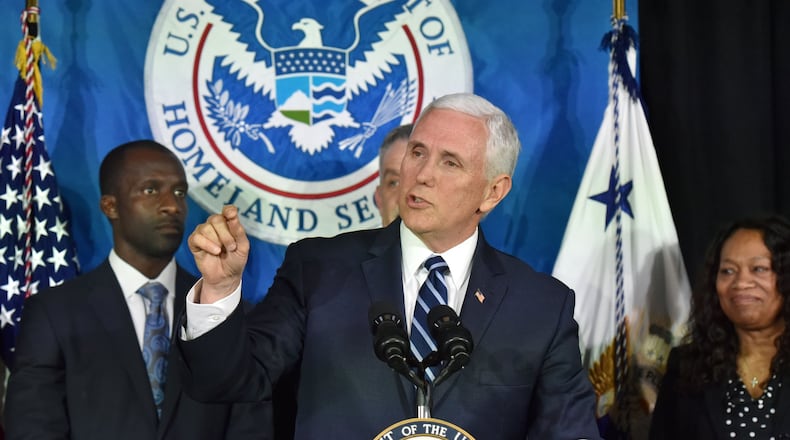Georgia law prohibits cities and counties from adopting a “sanctuary policy.” But that hasn’t stopped some from limiting their cooperation with federal immigration authorities.
Last year, for example, Atlanta Mayor Keisha Lance Bottoms signed an executive order barring the city jail from holding U.S. Immigration and Customs Enforcement’s detainees. Vice President Mike Pence blasted that decision during a visit with ICE officials in Atlanta last month.
“It is amazing to think the mayor actually said — in her words — she would not be complicit in an immigration policy that intentionally inflicts misery,” Pence said.
“I would say to the mayor that criminal illegal immigrants — gang members on our streets — are what inflict misery. The flow of illegal drugs like cocaine and meth and fentanyl inflict misery and wreck our families and communities. Human trafficking inflicts misery.”
The mayor has said her move was prompted by the Trump administration’s “zero-tolerance” immigration policy on the southwest border, which led to the separation of many immigrant families last year.
“If there are politicians whose family values include ripping children from their parents’ arms,” she said in response to Pence last month, “I fundamentally disagree and believe my decision to end that agreement fully reflects my values.”
» More: Pence blasts Atlanta mayor over decision to oust ICE from city jail
On Friday, President Donald Trump took to Twitter to announce he was considering releasing migrants apprehended at the southwest border in “sanctuary cities.”
“Due to the fact that Democrats are unwilling to change our very dangerous immigration laws, we are indeed, as reported, giving strong considerations to placing Illegal Immigrants in Sanctuary Cities only,” he tweeted. “The Radical Left always seems to have an Open Borders, Open Arms policy — so this should make them very happy!”
Trump did not name Atlanta or any other cities. But his proposal drew a sharp response from Bottoms.
“To turn the clock back to an era when certain segments of society were treated as property is immoral,” she said in a prepared statement. “This fear-mongering is feeding the rise of hate crimes in our country, endangers national security, and is a nothing more than a xenophobic game of partisan politics. We are better than this.”
Other Georgia cities and counties have taken steps to limit cooperation with ICE. In September 2014, Fulton County commissioners passed a resolution urging Sheriff Ted Jackson to block ICE from using county facilities for “investigative interviews or other purposes.” Two months later, the Clayton County Sheriff’s Office announced it would no longer comply with ICE detainers. And a month after that, the DeKalb County Sheriff’s Office said it wouldn’t honor those detainers without a warrant or “sufficient probable cause.”
Then in May of 2017, Clarkston’s City Council approved a policy saying city authorities shall not arrest or detain anyone based on ICE detainers. The council’s decision followed the announcements of Trump’s travel bans, his executive orders ramping up immigration enforcement and ICE’s arrests of many Somali nationals in Clarkston. Mayor Ted Terry called the council’s decision a “principled stance.”
» In-Depth: Georgia cities limiting cooperation with ICE amid Trump’s crackdown
In September of 2017, Decatur adopted a policy prohibiting city police from arresting, detaining or transporting anyone based solely on an ICE detainer. The city said its decision codified an unwritten policy Decatur police had been following for more than 10 years.
» More: Decatur, Georgia Immigration Enforcement Review Board settle lawsuit
Deputy City Manager Hugh Saxon said Friday: “The City of Decatur is not a sanctuary city.”
About the Author
Keep Reading
The Latest
Featured



